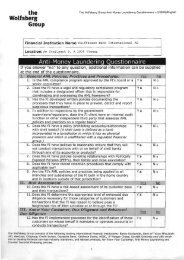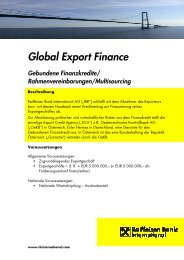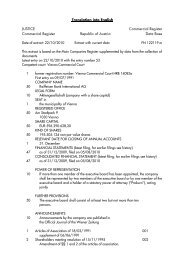Belarus - Raiffeisen Bank International AG
Belarus - Raiffeisen Bank International AG
Belarus - Raiffeisen Bank International AG
Create successful ePaper yourself
Turn your PDF publications into a flip-book with our unique Google optimized e-Paper software.
2. Company Law<br />
Forming a company as a foreigner<br />
6<br />
Foreign legal and natural persons can form companies in <strong>Belarus</strong> either on their own or together with one<br />
or more <strong>Belarus</strong>ian partners. Freedom of establishment is practically unrestricted, and foreign and<br />
<strong>Belarus</strong>ian investors are treated equally. Neither a <strong>Belarus</strong>ian minority nor a joint venture structure is<br />
required. As a result, companies can be 100 per cent foreign owned. The posts of general manager and<br />
company treasurer, which are important in <strong>Belarus</strong>ian law, can also be held by foreigners (though they must<br />
have a residence in <strong>Belarus</strong>).<br />
When one is working the <strong>Belarus</strong>ian market, the question often arises what form of business organization<br />
one should use to do so. If one plans to develop a presence of one’s own in <strong>Belarus</strong>, one must choose<br />
between setting up a representative office and forming one’s own company. The fundamental difference<br />
between these two forms of business organization is that a representative office does not have its own legal<br />
personality and is merely the extended arm of the parent company. In contrast, a company formed in<br />
<strong>Belarus</strong> has its own legal personality. One must decide the most advantageous form of market presence<br />
in each individual case based on the role of one’s branch in <strong>Belarus</strong> and the legal implications of that role.<br />
If an Austrian company does not actually want to actively carry on business locally and if its <strong>Belarus</strong>ian<br />
branch is solely designed to assist customers and the parent company, we would normally recommend<br />
setting up a representative office as a first step.<br />
Representative office<br />
The procedure for the opening and closing of representative offices of foreign companies in <strong>Belarus</strong> is regulated<br />
by the directive of the Council of Ministers of the Republic of <strong>Belarus</strong> (No. 929 of 22 July 1997).<br />
According to this directive, approval from the <strong>Belarus</strong>ian foreign ministry is required to open a representative<br />
office. Representative offices do not have their own legal personality. The head of the representative<br />
office is appointed by the parent company and acts on the basis of the powers he or she has been granted.<br />
A representative office is a ‘permanent representation’ for the purposes of <strong>Belarus</strong>ian tax legislation. It must<br />
therefore be registered with the tax authorities, submit an annual tax return and keep books in a businesslike<br />
manner. The big advantage of a representative office is—so long as its activities do not make it a permanent<br />
business establishment—that it is only captured by the <strong>Belarus</strong>ian tax system to a very limited<br />
extent. Apart from social security contributions for staff and VAT on goods and services purchased by a<br />
representative office, it does not have to pay any local taxes to speak of. This favoured tax status is lost if<br />
a representative office’s activities make it a permanent business establishment (i.e. if it carries on a commercial,<br />
for-profit activity locally). If that is the case, the representative office will be taxed like a company<br />
formed in <strong>Belarus</strong>. Under <strong>Belarus</strong>ian foreign exchange legislation, a representative office has non-resident<br />
status.
















